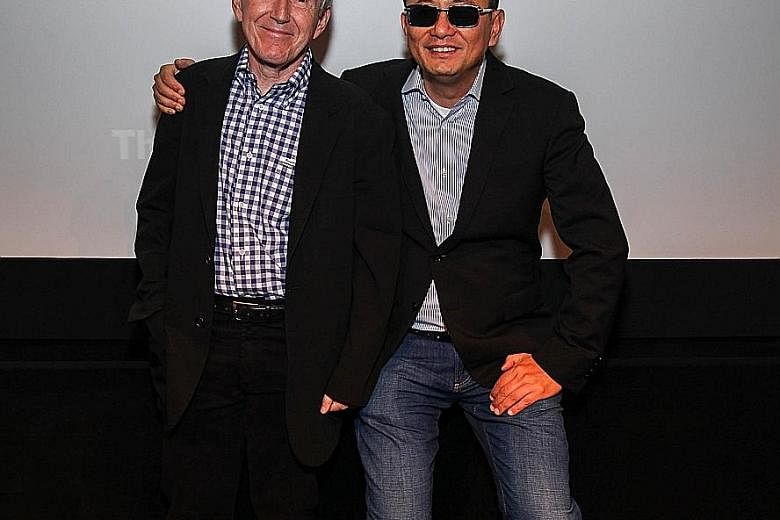It has been reported that auteur Wong Kar Wai's father worked on ships. But what is less known is that he later managed the largest nightclub in Hong Kong.
"That's almost never written about. And this nightclub was at Chungking Mansions," says John Powers, who writes about film and politics for Vogue magazine.
As any Wong Kar Wai fan would know, that building was the setting for Chungking Express.
The winner of the Hong Kong Film Award for Best Picture in 1995 featured a starry cast of Brigitte Lin Ching-hsia, Tony Leung Chiu Wai, Faye Wong and Takeshi Kaneshiro as they danced, dreamt and schemed at and around the gone- to-seed locale.
It is one of the many nuggets of information revealed in the book WKW: The Cinema Of Wong Kar Wai. The handsome tome by Wong, 57, and Powers, 65, is the first on the film-maker's entire body of work and is illustrated with more than 250 photographs and film stills. It is published by New York-based Rizzoli International Publications and is available at Books Kinokuniya here.

While Wong is a major figure on the international film scene, embraced by festivals and cineastes alike, there is also an aura of mystery around him, burnished by his ever-present shades and his media reticence.
-
In Wong's words
-
"Growing up in the Kowloon version of (the 1960 film) The World Of Suzie Wong, I was no stranger to miniskirts, high heels, and mascara. There were always women around who were like Carina Lau's character in Days Of Being Wild. That's why I feel very close to films by Fellini - I know that world. My childhood was sort of a La Dolce Vita: Hong Kong Style. I've known all these women - rambunctious, sexy, strong but vulnerable, and very friendly." Film-maker Wong Kar Wai in the book, WKW: The Cinema Of Wong Kar Wai, on the inspiration for some of the female characters in his films
"I took up this book for only one reason. My son turns 21 this year, leaving his boyhood behind to become a man. For him and for his youth, WKW has meant absence. At first, it was because I wanted to protect him from the spectacle my career has created, but later, he wanted to avoid the attention. Out of all my films, he has seen The Grandmaster and In The Mood For Love. When he sees the rest, I hope he can greet them as siblings because, in a way, they all grew up together. They were all born of words one must say in order to do anything bold in life: Yes, let's try." Wong on doing the book
Speaking over the telephone from his home in Pasadena, California, Powers says: "If you read the book, you will find out why he's an impressive guy. You'll get closer to the person who made the movies that you like than you've ever gotten before."
Wong's oeuvre of 11 movies includes the melancholic Happy Together (1997), swoonsome In The Mood For Love (2000), the impressionistic martial arts flick Ashes Of Time (1994) as well as the short film The Hand for the anthology film Eros (2004).
The book is structured into six conversations between director and critic as they discuss the works, their themes and Wong's personal life.
Powers says: "This was the one time he had ever talked about his family. People who know him and worked with him didn't know some of the stuff that was said in the book."
While the director's films throb and ache with romantic yearning and loss, his own love life could not be more stable. "He met his wife when she was 17 and he was 19 and they were selling jeans in a shop and, all this time later, they're still together. He's not somebody who's gone through all these tragic, heartbreaking things," Powers says.
Wong and his wife Esther have a son named Cheng, who is 21.
The Hong Kong street where Wong grew up after leaving Shanghai, where he was born, has served as inspiration for all his movies, most obviously in the ones set in the territory in the 1960s such as Days Of Being Wild (1990) and In The Mood For Love.
"The music and songs were playing on the street, there were martial arts studios across the street. The ladies of the evening rented rooms from the family, the mahjong games were there. It's all there."
Powers met the film-maker at a dinner in Los Angeles for Chungking Express, hosted by director Quentin Tarantino, who was distributing the title in the United States.
They have known each other for about 20 years. Powers says: "Wong's very easy to deal with. He's friendly, he's polite, he's funny. He's pleasant to be around, which helps explain why all those actors would put up with waiting around for months and working on movies which never seemed to end."
Part of the allure of Wong's movies is his ability to coax stars such as Tony Leung and Zhang Ziyi into giving some of the best performances of their careers.
Powers says: "Leslie Cheung became thought of as a serious actor because of the work he did for Wong."
The two collaborated on Days Of Being Wild, Ashes Of Time and Happy Together.
As for Wong himself, Powers says: "He is one of a handful of people who define cinema over the last 25 years around the world. A Wong Kar Wai movie always seems like a Wong Kar Wai movie. His sensibility is so strong, even when his style shifts, the mood and feeling and his approach are so clearly his."
A common motif in Wong's films is the appearance of clocks, though his own relationship with time can be a bit fraught.
Famously, the screening of 2046 at the Cannes Film Festival in 2004 had to be delayed as production went down to the wire.
And Powers had a taste of that working with the director on the book.
"My joke is that he's the Usain Bolt of delaying. No one in the world is faster at delaying," he quips with a reference to the record-breaking Jamaican sprinter.
But he later adds: "He's actually working fast by international famous film director standards."
•WKW: The Cinema Of Wong Kar Wai ($111.37, online price) is available from Books Kinokuniya.


